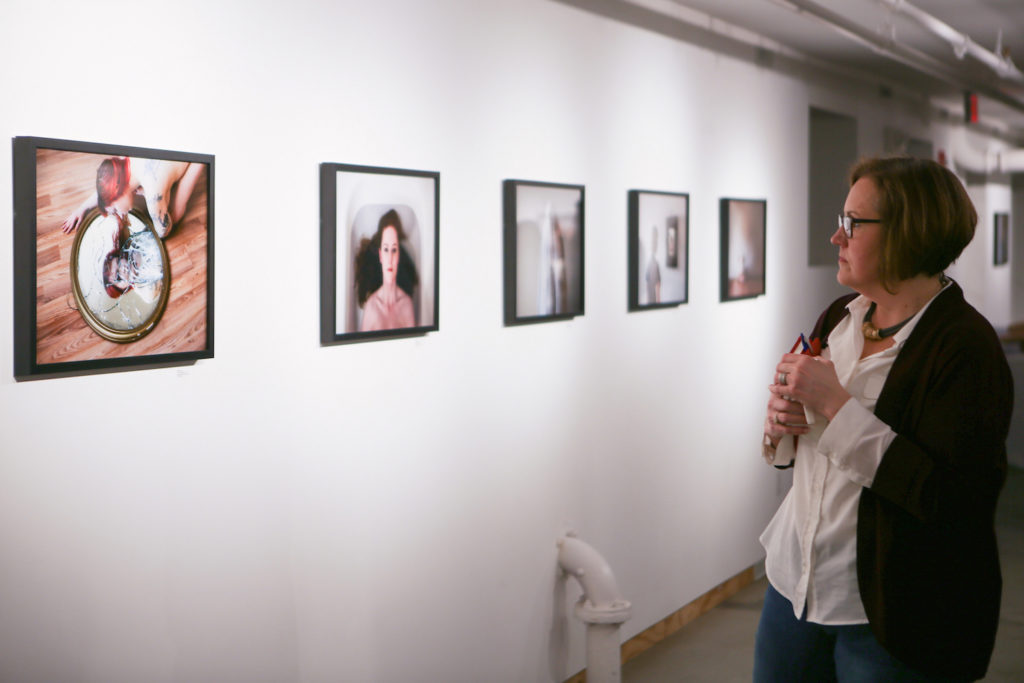By Marcella Kukulka, news correspondent
To remove the stigma society places on victims of emotional abuse, photographer Rachel Tine created “Invisible Fractures: The Enduring Trauma of Emotional Abuse.” Now on display at the Piano Craft Gallery on Tremont Street, the first-of-its-kind installation displays photographs and audio recordings that represent the tragic experiences of abuse victims.
Tine put together the exhibit to empower and give closure to victims of severe emotional abuse. She said she thought it was “important to help validate other people’s experiences in [her] own creative way.” The photographs in the exhibition feature 22 different women in individual photographs that were staged to exemplify what their abuse felt like.
“I was impressed by how many people chose my exhibit for their Friday night art fix. I haven’t processed all the things people have said to me but if it impacted people that’s the only thing I care about,” Tine said.
One popular feature of the exhibition was a canvas on which people anonymously wrote their personal experiences with abuse. Some of the featured quotes from the more than 30 people who signed the canvas include the following: “If you say something, you’re an immigrant and you will get deported,” “Nobody would believe you anyway” and “It’s supposed to hurt.”
Signs were also put up around the room in an effort to familiarize people with the warning signs of abusive relationships, how to identify them and ways to find help in that situation.
When Tine first began curating her project a year ago, it was very difficult to find a gallery that would display her work. Pares Mallis, the former Piano Craft Gallery director who approved the exhibition in 2016, said she was interested in showcasing Tine’s exhibit because of her personal experiences with abuse.
“Rachel came to me and I immediately said yes,” Mallis said. “I suffered from parental abuse when I was young and I thought it was an important subject that I had never seen brought into the art world.”
Tine began the creative process by sharing the project details on her social media account hoping that victims of abuse would see the posts and feel safe enough to reach out to her.
One of the models in the series, Jessica Cabral, was friends with Tine before the project began and is a survivor of emotional abuse.
“Rachel told me about the idea and I thought, ‘I’ve been there and that other people deserved to hear my story.’ I was comfortable to talk about it,” Cabral said. “She made me feel like anything I brought to the table was a good idea. It was definitely a therapeutic, cathartic process.”
Tine partnered with Casa Myrna, Boston’s largest provider of holistic services to victims of domestic violence, who was looking for an event to commemorate its 40th year of business. It was important for Tine to partner with a company that would raise money and advocate for her cause.
While Tine admitted that the environment when taking the photographs was usually “relaxed and happy,” she said it was also emotionally tolling to collect the audio stories, which are full of intimate details.
“It’s been heavy to carry the weight of everyone’s personal story,” Tine said.
Mallis and Cabral both agreed that participating in the series finally gave them closure from their pasts. Mallis explained that once her story was publicized by a professional, it was no longer hers and she felt freed from the weight her abuser left.
Leela Strong, a representative of Casa Myrna, said the gallery was packed with more than 200 visitors within the first hour of the opening reception.
“This is a pivotal moment for the gallery since it’s the first and only exhibition here that has been coupled with a social justice cause,” Sundstrom said. “We’re catching up since that is very mainstream nowadays.”
Kirby Page, a junior political science and international relations major at Boston University said that the exhibit’s focus on abuse and its consequences made survivors’ struggles more relatable.
“The first photograph that I saw was the picture of the woman looking into the mirror with a distressed face and tape measure around her waist,” Page said. “Even if you have never experienced abuse, it is easy to look at the picture and feel empathy since every girl in America has felt like that at some point.”
Matthew Mausner, a friend of the photographer and one of the models, said his favorite photographs showed the facial expressions of the survivors.
“The women have expressive faces calling for involvement,” Mausner said. “I wish I could dive more into it, know more about the models and understand the depth of the narratives.”
The appreciation and interest for the subject which the installation brings to light helps new audiences attempt to understand emotions they have not personally felt in order to be more receptive of survivors, something organizations like Casa Myrna have been working toward for years.
As a partner and sponsor of the exhibition, Casa Myrna will benefit from contributions made at the event. If you are in need, contact a representative at www.casamyrna.org or call the SafeLink Hotline at 1-877-785-2020 for help.
The exhibition is open to the public for free at the Piano Craft Gallery located on 793 Tremont St. The exhibition will be on show Fridays from 6-8 p.m. and on Saturdays and Sundays from 12-5 p.m. until Feb. 26. For more information, visit www.pianocraftgallery.com and www.racheltinephotography.com.
Photo by Dylan Shen
Correction: An earlier version of this article reported that more than 300 visitors signed the canvas and that the current gallery director provided an attendance estimate.









